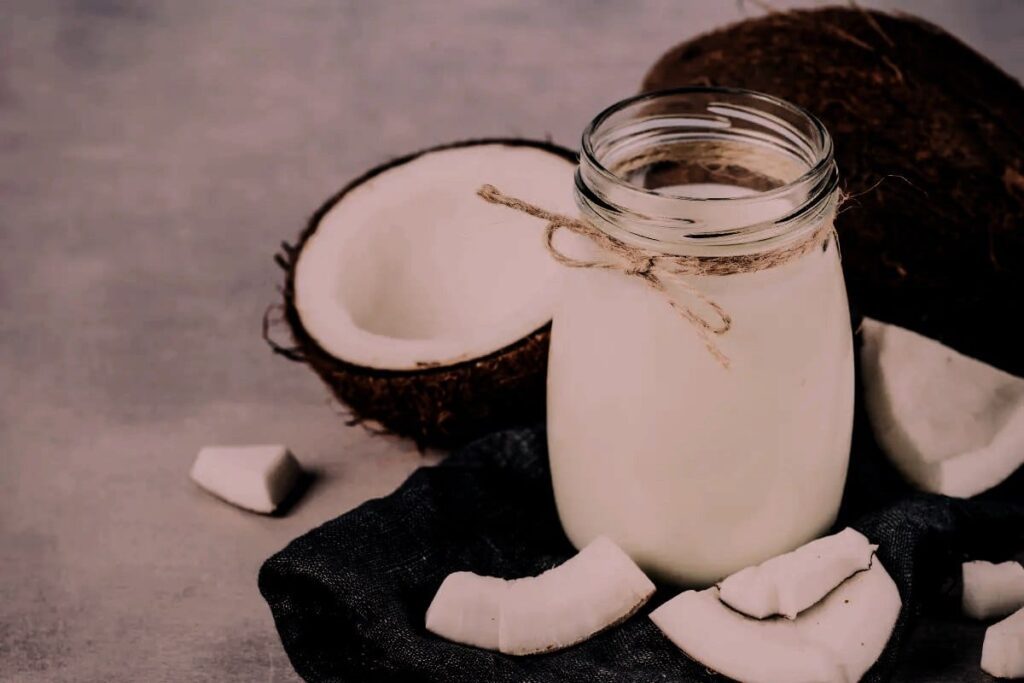Coconut milk, a creamy and versatile liquid extracted from the grated pulp of mature coconuts, has become a popular alternative to dairy milk. Beyond its culinary appeal, coconut milk is rich in nutrients that make it a staple in health-conscious diets worldwide. From vitamins and minerals to healthy fats, coconut milk offers a wealth of benefits worth exploring.

In this article, we’ll dive into the nutritional profile of coconut milk, its potential health advantages, and how it fits into various dietary lifestyles.
What Is Coconut Milk?
Coconut milk is a plant-based liquid made by blending coconut meat with water and then straining the mixture. It is different from coconut water, which is the clear liquid found inside young coconuts.
There are two main types of coconut milk:
- Thick Coconut Milk: Obtained from the first pressing of grated coconut, it is richer and creamier.
- Thin Coconut Milk: Extracted after a second pressing with added water, this version is lighter and often used in soups or curries.
Coconut Milk Nutrition Profile
Macronutrients per 1 Cup (240 ml):
- Calories: 445 kcal
- Total Fat: 48 g
- Saturated Fat: 43 g
- Protein: 4.6 g
- Carbohydrates: 6 g
- Fiber: 2 g
- Sugar: 3 g
Vitamins and Minerals:
- Vitamin C: 2.3 mg (3% of Daily Value)
- Iron: 7.5 mg (42% of DV)
- Potassium: 497 mg (14% of DV)
- Magnesium: 89 mg (22% of DV)
- Manganese: 2.2 mg (110% of DV)
- Calcium: 41 mg (4% of DV)
Health Benefits of Coconut Milk
1. Rich in Healthy Fats
Coconut milk is a source of medium-chain triglycerides (MCTs), a type of fat known for quick energy conversion and metabolism-boosting properties. MCTs are less likely to be stored as fat and can support weight management when consumed in moderation.
2. Supports Heart Health
Although coconut milk is high in saturated fat, most of it comes from lauric acid. Lauric acid has been found to increase levels of HDL (good cholesterol), which may improve cardiovascular health.
3. Boosts Immune Function
Lauric acid in coconut milk also has antimicrobial and antiviral properties, which help the body fight infections and improve overall immunity.
4. Promotes Digestive Health
Coconut milk contains dietary fiber, which aids digestion and promotes gut health. It is also a lactose-free alternative, making it suitable for those with lactose intolerance.
5. Supports Bone Health
While not as calcium-rich as dairy milk, coconut milk contains magnesium and phosphorus, which are essential for bone strength and density.
6. Anti-Inflammatory Properties
The antioxidants in coconut milk may help reduce inflammation in the body, benefiting individuals with conditions like arthritis or autoimmune diseases.
How to Incorporate Coconut Milk into Your Diet
1. Smoothies and Beverages
Coconut milk adds creaminess to smoothies and coffee. Blend it with fruits, greens, and protein powder for a nutritious drink.
2. Curries and Soups
Thick coconut milk is a staple in many cuisines, particularly in Thai, Indian, and Caribbean dishes. It enriches the flavors of curries, stews, and soups.
3. Desserts and Baking
Coconut milk can be used in desserts like puddings, ice creams, and cakes as a dairy-free alternative.
4. Dairy-Free Yogurt and Cheese
Coconut milk serves as a base for vegan yogurt and cheese recipes, offering a creamy and delicious substitute.
Coconut Milk for Different Diets
1. Keto Diet
With its high-fat and low-carb content, coconut milk fits perfectly into ketogenic meal plans.
2. Vegan and Vegetarian Diets
Coconut milk is an excellent alternative for plant-based diets, offering essential fats and minerals without animal products.
3. Gluten-Free Diets
Since coconut milk is naturally gluten-free, it’s safe for individuals with celiac disease or gluten intolerance.
4. Paleo Diet
Coconut milk aligns with paleo principles due to its natural origin and nutrient density.
Is Coconut Milk Good for Weight Loss?
Coconut milk can support weight loss when consumed in moderation. The MCTs it contains are metabolized differently from other fats, potentially boosting energy expenditure and satiety. However, its high-calorie content means portion control is crucial.
Potential Downsides of Coconut Milk
While coconut milk is highly nutritious, it’s essential to consider the following:
- High Calorie and Fat Content: Excessive consumption may lead to weight gain.
- Allergies: Rare, but some individuals may experience allergic reactions.
- Canned Coconut Milk Concerns: Canned versions may contain BPA or added preservatives. Opt for BPA-free and organic options.
How to Choose the Best Coconut Milk
- Check Ingredients: Look for pure coconut milk with no added sugars or preservatives.
- Consider Packaging: Choose BPA-free cans or cartons.
- Organic Options: Opt for organic coconut milk to avoid pesticides.
Coconut Milk in Traditional Medicine
Coconut milk has been used in traditional Ayurvedic and Southeast Asian medicine for its soothing and nourishing properties. It is often included in remedies for improving skin, reducing inflammation, and boosting energy levels.
Cooking Tips with Coconut Milk
- Shake or Stir Before Use: Coconut milk can separate in cans; shake well to mix.
- Store Properly: Once opened, refrigerate and use within 5 days.
- Freeze Leftovers: Coconut milk can be frozen in ice cube trays for later use.
